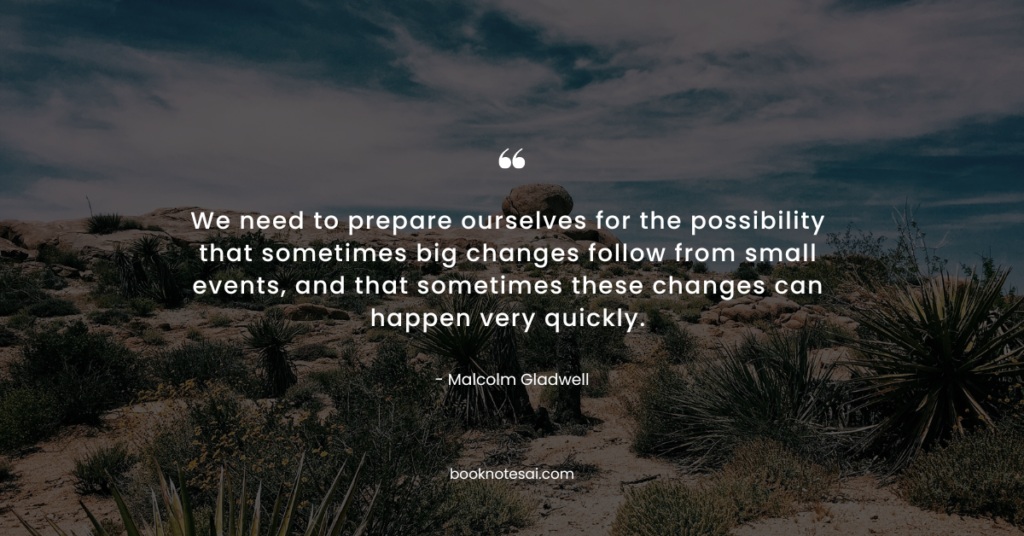Listen To This Post
How Little Things Can Make a Big Difference.
Just as a single sick person can start an epidemic of the flu, so too can a small but precisely targeted push cause a fashion trend, the popularity of a new product, or a drop in the crime rate.

This is a book summary for The Tipping Point by Malcolm Gladwell. The essential information is structured to be straightforward, useful, and valuable, all while helping you save plenty of time.
Introduction: Why this book?
- In The Tipping Point, Malcolm Gladwell delves into the intriguing phenomenon of how small actions can lead to significant societal changes.
By dissecting pivotal moments in history and modern culture, Gladwell elucidates the underlying principles driving social epidemics. - Through understanding the dynamics explored in The Tipping Point, you gain insights into how trends emerge, ideas spread, and behaviors influence the world around us, making it a compelling read for anyone curious about human behavior and societal trends.
The Tipping Point Summary:
- Gladwell explores the concept of the tipping point, the moment when an idea, trend, or behavior crosses a threshold and spreads rapidly, akin to an epidemic.
- He delves into the factors contributing to the tipping point, including the roles of connectors, mavens, and salesmen in disseminating ideas.
- Gladwell examines the significance of context and environment in shaping behavior and driving social change.
- The author provides compelling case studies and anecdotes, illustrating how seemingly minor changes can lead to monumental shifts in society.
- Ultimately, The Tipping Point serves as a thought-provoking exploration of the subtle yet powerful forces that shape our world.
💡 5 Big Ideas
- The Power of Context: Gladwell emphasizes how the environment and circumstances can dramatically influence human behavior and decision-making processes.
Understanding the context is crucial for effecting meaningful change in various settings. - The Law of the Few: By highlighting the roles of connectors, mavens, and salesmen, Gladwell underscores the importance of influential individuals in driving social epidemics.
Identifying and leveraging these key players can amplify the impact of ideas and messages. - The Stickiness Factor: Gladwell introduces the concept of the stickiness factor, referring to the unique characteristics that make an idea or message memorable and compelling.
Crafting content with high stickiness is essential for achieving widespread adoption and influence. - The Importance of Small Changes: Through numerous examples, Gladwell illustrates how seemingly minor adjustments can lead to significant outcomes, catalyzing tipping points and triggering societal transformations.
- Recognizing Tipping Points: By understanding the dynamics of tipping points, individuals and organizations can identify opportune moments for effecting change and harnessing the power of social epidemics.
Recognizing tipping points empowers us to be proactive agents of positive transformation.
Understanding these big ideas equips you with valuable insights into human behavior, facilitating more effective communication, marketing strategies, and societal interventions.
Powerful Quotes
- “The tipping point is that magic moment when an idea, trend, or social behavior crosses a threshold, tips, and spreads like wildfire.”
This quote highlights the pivotal moment of change in society. - “The success of any kind of social epidemic is heavily dependent on the involvement of people with a particular and rare set of social gifts.”
This quote emphasizes the role of influential individuals in driving societal shifts. - “There is a simple way to package information that, under the right circumstances, can make it irresistible.”
This quote underscores the importance of crafting compelling messages and content. - “Sprinkling little changes throughout a system can have huge effects—similar to the way that a seemingly small illness like the flu can spread throughout the world.”
This quote illustrates the power of small actions in generating significant outcomes. - “The tipping point is the biography of an idea, and the idea of an epidemic.”
This quote encapsulates the central concept of the book—examining the dynamics of societal contagion. - “We need to prepare ourselves for the possibility that sometimes big changes follow from small events, and that sometimes these changes can happen very quickly.”
This quote underscores the potential for rapid and transformative shifts in society. - “The success of any kind of social epidemic is heavily dependent on the involvement of people with a particular and rare set of social gifts.”
This quote emphasizes the role of influential individuals in driving societal shifts. - “The tipping point is that magic moment when an idea, trend, or social behavior crosses a threshold, tips, and spreads like wildfire.”
This quote highlights the pivotal moment of change in society. - “The tipping point is the moment of critical mass, the threshold, the boiling point.”
This quote elucidates the notion of the tipping point as a critical juncture in social dynamics. - “Look at the world around you. It may seem like an immovable, implacable place. It is not. With the slightest push—in just the right place—it can be tipped.”
This quote inspires readers to recognize their capacity to effect change in the world.
One Reason To Read This Book:
Unveiling the intricacies of social dynamics and human behavior, The Tipping Point offers profound insights into how small changes can yield monumental results, making it essential reading for anyone intrigued by the mechanisms shaping our world.
Who should I recommend The Tipping Point summary to?
If you’re fascinated by human behavior, social trends, or the mechanisms behind societal shifts, The Tipping Point summary is a must-read.
The professionals in marketing, psychology, sociology, and leadership will find its insights invaluable for understanding and influencing human behavior
Recommendations:
- “Made to Stick” by Chip Heath and Dan Heath: Explores the principles of creating memorable and impactful ideas.
- “Influence: The Psychology of Persuasion” by Robert B. Cialdini: Examines the psychology behind persuasion and influence.
- “Contagious: How to Build Word of Mouth in the Digital Age” by Jonah Berger: Analyzes why certain ideas go viral and how to make messages more contagious
The summary provided here offers a glimpse into the discussed title The Tipping Point, providing valuable insights. For a richer understanding, we recommend delving into the full book.


